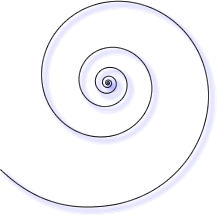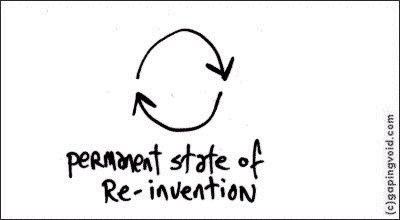
Perpetual Education = Perpetual Learning
Clarence Fisher posted this picture today from Gaping Void and states:
Â…this says what education is all about these days.
I couldnÂ’t agree more. IÂ’ve been thinking about my posting a while back on education being perpetual beta.
Perpetual Schools: A theme for many educators is the idea that schools are ever evolving to meet the real-time demands of students. Rather than release scheduled theory updates. Educators like Google will add features as they become available and adapt dynamically to their students’ requirements, which are in turn de facto ‘testers.’
Instead of looking like the Gaping Void picture perpetual education looks like this:

Not just re-inventing but continually improving. That is the theory behind beta products. In a beta product you donÂ’t just continually improve the options within the product, but you continually look for new things to add to the product that improve it, make it more relevant and more user friendly. In education that would mean not just looking at writing for example and the writing process, but how you could expand that writing to more audiences. To cover different types of writing and improve the writing system that already exists. The evolution of blogs in the classroom is a perfect example. Clarence and his students continue to find new ways to improve their blogs and to reflect on the writing process.
This week we’ve gone one step further by having the blog posts of the week not have to be written by someone in our class.
This is just one more step the students have made. ItÂ’s been fun to watch ClarenceÂ’s students grow with the blogs and continually find new ways to use them and improve them. From podcasting to linking to other classes the students, when giving the freedom to do so will create their own learning situations.
The kids wanted to expand the network, asking why the blog posts of the week had to come from our class. Could they not consider the work of others?
The kids become the driving force behind the education, as a teacher you just need to get out of their way and let them learn. David Warlick touched on this as well in Curriculum is Dead:
Anyway, the point is this. Education, defined by its limits, required a curriculum that was packaged into products that could be easily used in the classroom. We used textbooks with scope and sequence, pacing guides, and a teacherÂ’s guide with the answers.
Education, defined by it’s lack of limits, requires no such packaging. It’s based on experiences, tied to real-world, real-time information that spans the entire spectrum of media — crafted an facilitated by skilled teachers, who become more like tour guides than assembly-line workers.
When you take the limits of education away and just allow learning to take place, the real perpetual activities begin. Once you allow education to become perpetual then perpetual learning takes place.
Perpetual Learning: An idea that knowledge is ever evolving to meet the real-time demands of learners. Rather than release scheduled theory updates, learners, like Google, will add features as they become available and adapt dynamically to their ever changing environment, which in turn makes learners de facto ‘testers.’
Technorati Tags: perpetual education, David Warlick, Clarence Fisher, Gaping Void








Hi Jeff,
Below is an excerpt of a blog entry I made in response to your entry. I can’t figure out trackback, so I’m letting you know “the old fashioned way”.
With the whole world seemingly gearing up with Web 2.0 enthusiasm (myself included)Â… ItÂ’s difficult to be a thinking person these days. EveryoneÂ’s a skyÂ’s the limit dotcom dreamer again. Educators and artists, businessmen and technologists, everybodyÂ’s clamouring to do the best thing with the next thing. Surrounded by all this exuberance for technological salvation, I feel like a wet blanket even wondering privately whether each new idea is a great one.
On first glance, doesnÂ’t it seem like a wonderful new world (brave even ;-), where every teacher is busy reevaluating and reinventing every lesson, constantly, indefatigably and with great enthusiasm, where nothing but a skeletal idea remains after each teaching, because each learner is unique and requires new solutions? On the face of it, it sounds like great: shouldnÂ’t we all, always, be in a permanent state of reinvention? IÂ’m not so sure.